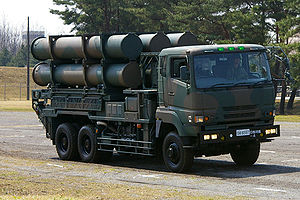Type 88 surface-to-ship missile
| Type 88 surface-to-ship missile, SSM-1 | |
|---|---|
 | |
| Type | Anti-ship cruise missile |
| Place of origin | Japan |
| Service history | |
| In service | 1988 |
| Production history | |
| Manufacturer | Mitsubishi Heavy Industries |
| Specifications | |
| Mass | 661 kg (1,457 lb) |
| Length | 5.08 m (16.7 ft) |
| Diameter | 350 mm (13.8 in) |
| Warhead | HE |
| Warhead weight | 225 kg (496 lb) |
| Engine | Mitsubishi TJM2 turbojet + one solid rocket booster[1] |
Operational range | 180 km (97 nmi; 112 mi) |
| Flight altitude | 5-6 m |
| Maximum speed | Mach 1.5 [?] [citation needed] |
Guidance system | Inertial guidance and terminal active radar homing |
Launch platform | Truck (Fuso Super Great, Fuso The Great) |
The Type 88 surface-to-ship missile (88式地対艦誘導弾, SSM-1) is a truck-mounted anti-ship missile developed by Japan's Mitsubishi Heavy Industries in the late 1980s. It is a land-based version of the air-launched Type 80 (ASM-1) missile; in turn it was developed into the ship-launched Type 90 (SSM-1B) missile. The Japan Ground Self-Defense Force bought 54[1] transporter erector launchers, each carrying six Type 88 missiles, for use as coastal batteries. With a range of 180 km (97 nmi; 112 mi), high subsonic speed and 225 kg (496 lb) warhead, it is similar to the US Harpoon missile.
In 2015, an upgrade of the Type 88 became operational called the Type 12. The Type 12 features INS with mid-course GPS guidance and better precision due to enhanced TERCOM and target discrimination capabilities. The weapon is networked, where initial and mid-course targeting can be provided by other platforms, and also boasts shorter reload times, reduced lifecycle costs, and a range of 200 km (110 nmi; 120 mi).[2][3]
Overview
[edit]
The basic configuration composes the same launcher vehicles and loader vehicles (6 SSM-1), some radar vehicles, fire control systems, and a command control system.[citation needed]
Usually, the SSM-1 is launched from within 100 km (62 mi) of the target.[citation needed]
See also
[edit]- Anti-ship missile
- Type 80 air-to-ship missile
- Type 90 ship-to-ship missile
- Type 93 air-to-ship missile
- Type 12 surface-to-ship missile
- XASM-3
References
[edit]- ^ a b Wertheim, Eric (2007). The Naval Institute Guide to Combat Fleets of the World: Their Ships, Aircraft, and Systems. Naval Institute Press. p. 374. ISBN 9781591149552.
- ^ LaGrone, Sam (18 June 2014). "China Reacts to Japanese Anti-Ship Missile Positioning". USNI News. Archived from the original on 9 July 2024. Retrieved 9 July 2024.
- ^ Japan Plans To Deploy Missiles To Strategic Island Near Taiwan - Foxtrotalpha.Jalopnik.com, 19 May 2015

